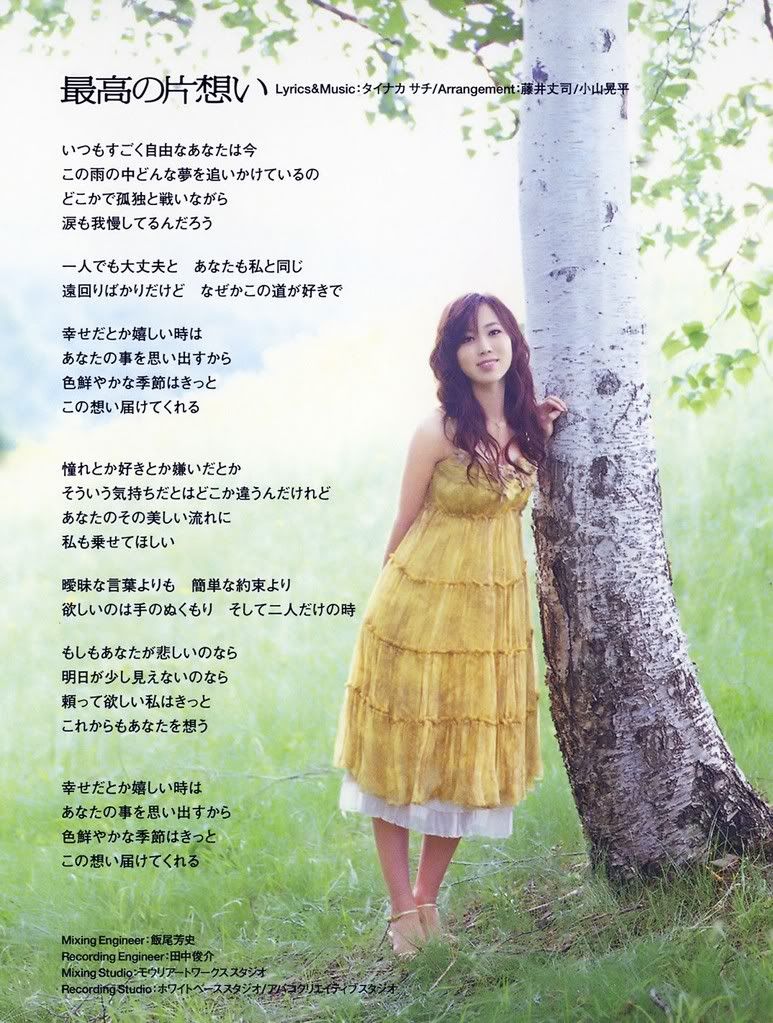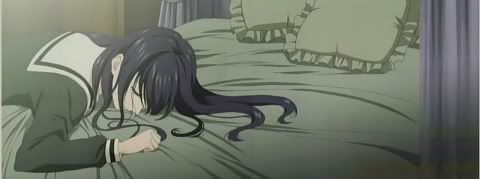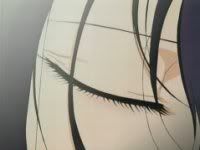.
いつもすごく自由なあなたは今You.... Always so full of freedom
Toi qui respires toujours la liberté,
この雨の中どんな夢を追いかけているの
What kind of dream are you now chasing after amidst this rain?
Quel rêve poursuis-tu donc à présent sous cette pluie?
どこかで孤独と戦いながら
Somewhere, you're fighting your loneliness
En combattant cette solitude bien cachée
涙も我慢してんだろう
And your tears are also being held on
Tu retiens jusqu'à tes larmes
一人でも大丈夫とあなたも私も同じ
Saying you're fine by yourself, you're just like myself,
Toi comme moi, nous disons être heureux seuls
遠回りばかりだけど なぜかこの道が好きで
We may stray on detours but, somehow this path is the one we like
Et bien que nous fassions parfois des détours, cette voie nous convient
幸せだとか嬉しい時は
Because through joy and happy times
Moments de bonheur ou simple joie,
あなたの事を思い出すから
I still think of you then
Parceque tout me fait penser à toi
色鮮やかな季節はきっと
The colorful seasons will surely
Les saisons passent riches en couleurs
この思い届けてくれる
Convey these feelings to you...
Et surement,
Elles m'aideront à te faire parvenir mes sentiments
** This song **
I had this song for a while, and though I liked it somehow, I didn't pay attention to the lyrics and just listened to the melody of the piece, and the melody of the words... Then yesterday, I randomly picked up an old playlist and this one came up : "saikou no kataomoi", which can be translated as "the best unrequited love", by Tainaka Sachi. I was struck by both the melody, the air it bears and the words of the song. They are a lot like what I have in mind concerning the feelings of my heroine, her way of seeing her unrequited love *well, only at some point mind you, these things are fortunately bound to evolve*.
This is only the first verse and the chorus. This alone drawn me into the song's world, and already fit my idea of a way to live this unrequited love", so I only put the first half of the song here.
** My translation **
So yes, I could say they touched me, and I attempted to translate them for anybody who might stumble here, but I don't think my translation bears the beauty of the original japanese words. A language holds its peculiar view and conception on every complicated and simple thing, so as translators we constantly fight between sticking to the given sense, and writing what we feel the original words aim at, and choosing which words in the language of transposition would match those conceptions or feelings. Choosing to transpose what you felt was the closest meaning of the original, can end up in your work having a -seemingly- different meaning, literally speaking, than the original word that one was to be put in an online translator.... and the source of long, tiring discussions. Translating can be both very interesting, passioning, and a very torturing process.
Link : the lyrics from the CD's booklet
I had this song for a while, and though I liked it somehow, I didn't pay attention to the lyrics and just listened to the melody of the piece, and the melody of the words... Then yesterday, I randomly picked up an old playlist and this one came up : "saikou no kataomoi", which can be translated as "the best unrequited love", by Tainaka Sachi. I was struck by both the melody, the air it bears and the words of the song. They are a lot like what I have in mind concerning the feelings of my heroine, her way of seeing her unrequited love *well, only at some point mind you, these things are fortunately bound to evolve*.
This is only the first verse and the chorus. This alone drawn me into the song's world, and already fit my idea of a way to live this unrequited love", so I only put the first half of the song here.
** My translation **
So yes, I could say they touched me, and I attempted to translate them for anybody who might stumble here, but I don't think my translation bears the beauty of the original japanese words. A language holds its peculiar view and conception on every complicated and simple thing, so as translators we constantly fight between sticking to the given sense, and writing what we feel the original words aim at, and choosing which words in the language of transposition would match those conceptions or feelings. Choosing to transpose what you felt was the closest meaning of the original, can end up in your work having a -seemingly- different meaning, literally speaking, than the original word that one was to be put in an online translator.... and the source of long, tiring discussions. Translating can be both very interesting, passioning, and a very torturing process.
Link : the lyrics from the CD's booklet
.







